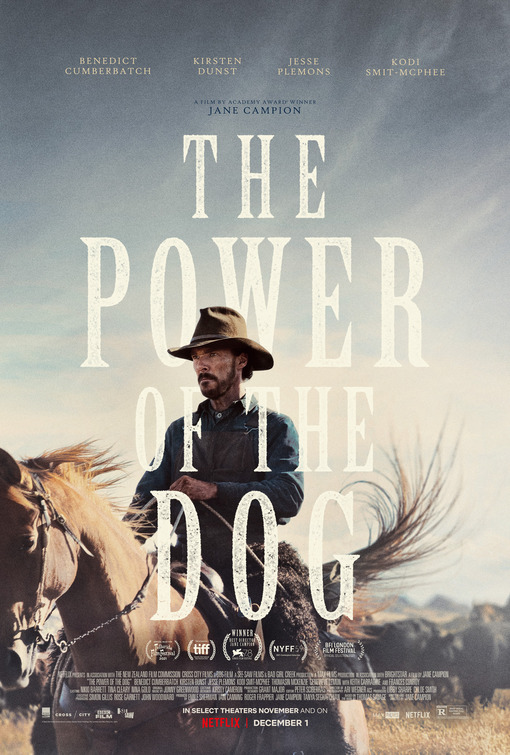
The “power of the dog” can be those physical and psychological forces that come to destroy us. Jane Campion’s latest is a western of sorts, but given the output of the iconoclastic director, you know this won’t be a straightforward actioner with cowboys and gunfights. She’s helming a feature film for the first time in 12 years. The New Zealand filmmaker’s last was Bright Star (2009), but she is best known for The Piano (1993). Her current feature is a character-based drama that she adapted from a 1967 novel by Thomas Savage. Call it an anti-western.
This tale set in the 1920s concerns the Burbank brothers. Ranchers Phil (Benedict Cumberbatch) and George (Jesse Plemons) live together on their parents’ sprawling ranch in Montana. Phil is a spiteful man consumed by personal demons. Unloveable and seemingly incapable of love. He is a bully, dominating others before he can be dominated. On the other hand, George is considerably more civilized: quiet and polite. He still affects the air of a gentleman. To put it more simply, George takes baths. Phil doesn’t bathe. Despite being less intellectually inclined than Phil, George handles the paperwork of the ranch as the businessman.
The languid story begins to take shape at the Red Mill restaurant. During a cattle drive, they stop at the establishment run by a fragile widow named Rose (Kirsten Dunst). Soon after meeting, George reveals that he and Rose have married. Their relationship will prove to be a thorn in Phil’s side. Phil’s bitter dislike of Rose festers over time. His behavior has a detrimental effect on her well-being. She also has a son Peter (Kodi Smit-McPhee), a frail teen the oppressive Phil insults. These interactions will weigh on his mother.
A sample of one antagonism that really got under my skin. When Phil and Peter first meet, the boy is waiting tables at the restaurant. Phil is a patron. The intricate paper flowers Peter has created adorn the tables. We’ve seen the care he puts into making each one. The exquisitely made decorations embody delicacy and beauty. “I wonder what little lady made these,” Phil taunts. He casually sets one afire to light his cigarette in front of its creator. The callous act is the gleeful destruction of hard work, and it’s unnerving in a way that’s hard to explain. The sinister gesture perfectly clarifies his outlook more than pages of words ever could.
The Power of the Dog is an impressive ensemble piece concerning individuals with ambiguous motives. Kirsten Dunst, Jesse Plemons, and Kodi Smit-McPhee all contribute memorable performances. But it’s the nuanced achievement from Benedict Cumberbatch as the tragic figure at the center of it all that unites the chronicle. He exposes the compelling depths of the human psyche within this multi-faceted soul. The narrative can be seen from more than one point of view. The aching void of loneliness has reduced Phil to a hateful shell. George is trying to eke out a happy life in a savage frontier. Meanwhile, Peter wants to save his mother’s descent into alcoholism brought on by a pernicious presence in her home. The three form a triad that engages the viewer. These are impressively complicated personalities. For example, Peter is capable of creating exquisite centerpieces from paper, but can also unemotionally dissect a cute bunny rabbit in his desire to become a surgeon.
The Power of the Dog is an unrelenting depiction of sadness. The saga can be difficult to embrace. However, there is so much to appreciate here. Cinematographer Ari Wegner (True History Of The Kelly Gang) beautifully highlights the visual sweep of the American West. The expansive vistas evoke the work of legendary directors John Ford and George Stevens. Johnny Greenwood’s (Phantom Thread) uneasy score is the aural manifestation of impending danger. The methodic pace of the gradually unfolding account builds. I kept second-guessing the intentions of the characters at every turn until the very end. The narrative takes quite a while to get started but things get pretty intense in the final 30 minutes. The ending is a shocker that will undoubtedly inspire conversation. I’m still thinking about these people and their motivations. Our contempt and disdain are elicited throughout the picture. Yet these people have humanity which means sometimes our gut reactions may not be justified. Jane Campion’s meticulous portrait ends in tragedy. Where the tragedy truly lies, however, is open to interpretation.
12-02-21

6 Responses
This is one of those movies you talk about for a week after. There are so many conclusions you come up with, then you realize how tragic the truth was, and it makes you kinda sad. Slow start, but wow, mind was all over the place as it continued. Great performances all around. 4 ⭐️
I did like the film but it’s quite depressing. Very well done though. I suspect it’ll be big this awards season.
This is my pick for Best Picture, and I suspect it will win in quite a few other categories as well. You’re right it’s not a happy little film but it is masterful.
Agreed. It’s a masterful film. It made my Top 10 for last year.
I really enjoyed this move, a masterpiece. Reminded me a bit in style and mood to “There Will Be Blood”. Head was spinning for a few days after 🙂
Yeah that ending stays with you. 👍🏼